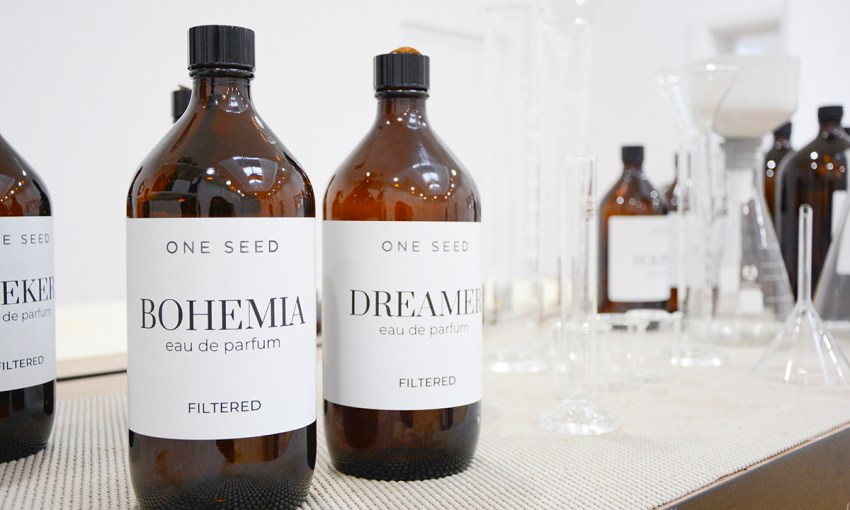There are few experiences in life that tantalise the senses and evoke memories the way a beautifully crafted perfume can.
Bespoke fragrances: The scent of identity
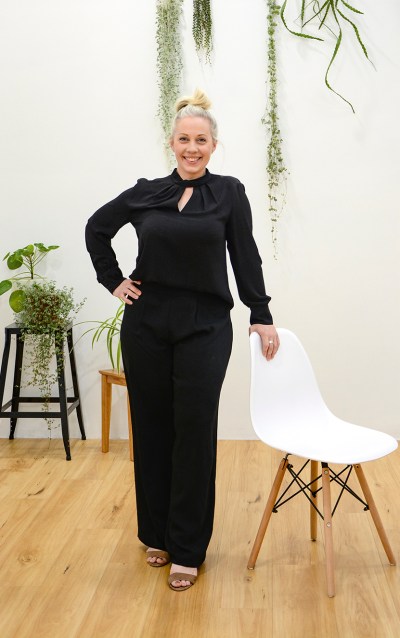
Seed to scent
There’s only one way to describe walking into One Seed Perfume’s head office at Port Adelaide: it’s simply delightful.
Down an unassuming side street in the historic suburb, the perfume company’s HQ is an oasis.
Natural light pours in through sky lighting. Exposed brick sits perfectly with big, white walls and pops of greenery. But mostly, the scent is a breath of fresh air.
The company only moved into the building earlier this year — they’ve been steadily outgrowing each place they inhabit, beginning with founder Liz Cook’s home.
Liz started the business 10 years ago, after owning natural skincare company Out of Eden. During that time, she found there was a growing number of customers asking about natural perfumery.
“I had an idea in the back of my mind to create perfumes,” Liz says. “At the time, people weren’t really considering natural perfumes, and a lot of people still don’t. They switch everything to natural, and perfume tends to be an afterthought.”
Customers would come to Liz, with her background in aromatherapy, to see if she could replicate their synthetic perfumes with natural ingredients. At the time, she didn’t know how to create perfume, but the idea stuck and after selling Out of Eden, she began work on what is now One Seed.
“When I started 10 years ago, first of all, everyone thought all perfume was natural, secondly, they did not want to know anything about natural perfume if it wasn’t what they were wearing because they wanted the brand names.”
Over the past three years, Liz has seen a shift. Boutique perfume brands offering an alternative are now gaining popularity. “There’s been more embracing us as a perfume company and of course people are much more aware of what they’re putting on and into their bodies.”
All of One Seed’s products are 100 per cent natural, a minimum 80 per cent organic, vegan and cruelty-free. “We don’t use synthetics anywhere. Ever. It’s completely banned off our list; we don’t even entertain the thought.”
Not only are the actual perfumes natural, but the creative process behind them has a very organic, natural aspect.
Liz works first with words, emotions and feelings and builds on those to create a sense of place with her fragrances. One of the colognes, Solitude, was inspired by stillness and the kinds of places that make you stop and breathe, such as a cabin in the woods.
“I saw this photograph taken in the middle of a forest of birch trees, with just a little bit of sun coming through. It made me think of the stillness of your soul.”
From a word or a quote or a feeling, Liz begins to think about the fragrances related to the abstract concepts. And somehow, inhaling Solitude takes you right to that cabin with its notes of black pepper, dry woods and aromatic plant ambrette, among others.
Liz finds customers will often be drawn to the name of a fragrance and find an affinity with the scent.
Over the past year, One Seed has sold 10,000 units and it doesn’t look like slowing down any time soon.
At the moment, Liz is busy creating a second-tier range, in addition to the current 11 scents, which are lighter and all go well together. An extension of the men’s range is in the works.
Now that people are starting to put down their synthetic perfumes, Liz offers an alternative and makes it easy to choose. The website lets you know if you might like one of the fragrances based on a list of big brand scents you’re familiar with.
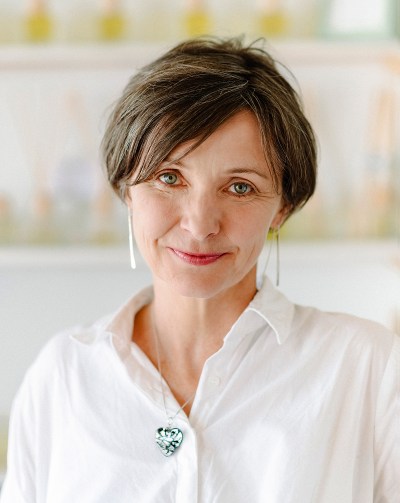
Mixing and matching
If Cherie Foran ever invites you to descend the steps into her cellar of scents, make sure you take her up on the offer.
Beneath her Brighton store, Cherie Em, down a winding staircase, you’ll discover a cosy room with rows and rows of tiny bottles of fragrant oils.
But the real magic happens when Cherie asks a few simple questions about likes and dislikes to bring together the perfect suite for your particular olfactory system.
There’s been a trend towards the unique and personalised of late, and Cherie’s offering is a special one.
When clients go to Cherie for a new fragrance to fit them perfectly, the experience is often far more emotional than they’d expect. With our sense of smell so closely linked to memories, Cherie says fragrance buying can delve deep into a person’s past.
“I find that scent is very linked to our childhood memories,” Cherie says. “It often has a very beautiful relationship with our grandparents and our parents. Sometimes it’s quite emotional — I’ll get an 80-year-old in here who will remember something that happened to her 70 years ago with her grandparents.”
Frankincense is becoming more popular, but Cherie says some of her friends from Catholic school find it unpleasant because it takes them right back to mass.
“People often react well to geranium, which used to grow really well here 50 years ago, because it takes them straight back to their grandmother’s garden. For some, they love that. For others, they don’t want to smell like an old lady. It’s getting that fine balance.”
Some people are transported to the kitchens of their childhood with citrus and spice notes.
Cherie says she rarely finds a scent she doesn’t like. “If I don’t like something, it just means I don’t like it at full strength, but in dilutions, it can really work.”
One of her more adventurous concoctions is one she’s working on at the moment — a men’s fragrance using a tobacco scent. “At full strength, it smells like cigarettes, but when diluted, it has a fruity aspect to it.”
Cherie’s love of all things natural has been a lifelong pursuit. Her mother Marilyn is a retired naturopath and the values have been passed on.
Cherie says most people have some memory of their mother’s fragrance, but she doesn’t because Marilyn would never wear the heavily-scented synthetic perfumes popular during her childhood. Although, Marilyn now uses a fragrance Cherie named after her.
The range is 100 per cent botanical and handmade, without synthetic ingredients, colourants, animal ingredients, phthalates, sulphates and parabens.
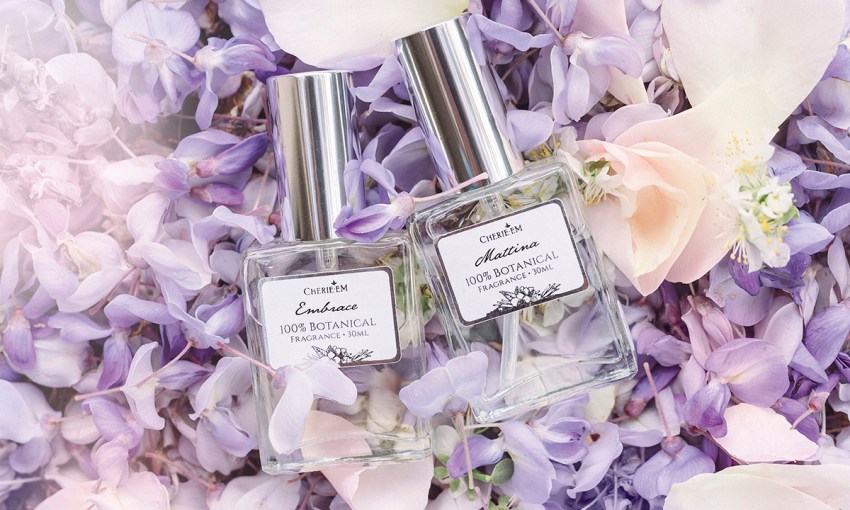
Cherie was introduced to essential oils 30 years ago and has never looked back in her quest to become more natural. She has studied aromatherapy, natural perfumery and has almost completed an advanced diploma in organic cosmetic science.
“I’ve been growing things organically since my children were babies because I wanted to give them organic food.” Now, she tinctures organic ingredients to make the base of some of her scents and skincare
Cherie always has her nose and mind open to the elements, never knowing what will inspire her. “The fun part is blending to get a good scent. It’s almost like a marriage where you can see couples bringing out the best in each other even though they’re different. Or like when you go to a party and someone’s really sparkly and someone’s deep and meaningful. Citrus notes are like the sparkly, fun notes.”
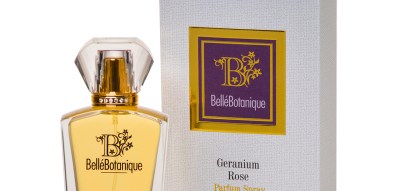
Global scents
Belle Botanique’s collection of fragrances is a virtual trip around the world.
Geraniums from Egypt, roses from Bulgaria, citrus oils from Italy, tangerine oil from Brazil and ylang ylang from Madagascar.
Director of research and development Manoj Jain is very particular about the ingredients that go into his perfumes, and even more importantly, the ingredients that are left out of them.
Belle Botanique has formulated what they believe — to the best of their knowledge — is the world’s first not only natural, but completely allergen-free perfume.
Allergens can be found in natural products, such as genuine citrus and rose oils, but their Amyris Vetiver fragrance is all about the pureness of nature, escaping the pollution of city life.
“The perfume industry is not only dominated by the synthetic aroma chemicals,” Manoj says. “But when you smell them, it seems most of them have that same profile; sweet and fruity. We are losing that idea of what oranges really smell like, or what roses smell like, or what it’s like to go out into a forest or jungle and smell the leaves.”
In addition to their natural skincare range, Manoj and his team developed a fragrance line that is natural and non-toxic, using botanical extracts, floral extracts, fruits and leaves.
“A lot of the ingredients have been scientifically proven to boost our neurotransmission connection and communication, so rather than harming, they are helpful.”
The collection steers away from the eye-wateringly sweet scents we’ve become accustomed to, and delves into clean, pure scents, such as the fruity and spicy Tangerine Cardamom scent, and the Geranium Rose fragrance, with notes of vetiver and patchouli.
Manoj says many fragrances on the market are created using dome technology — the botanical scientists want to replicate are placed in a dome, the frequency measured and synthetically replicated using petroleum.
A compounded synthetic rose fragrance sells for around $300 a kilogram, pure rose extract from Bulgaria is $6000 to $8000 a kilogram. But Manoj isn’t prepared to cut corners.
He says using natural products eliminates health concerns and gives a true representation of nature’s scents.
In creating the fragrance line, Manoj and perfume designer Peta-Ann Jain have tested countless combinations of ingredients.
“Perfume is like a melody, you double up notes upon notes, then the final fragrance is one beautiful song,” Manoj says.
The hunt for beautiful, natural scents began long ago for Peta-Ann. “The first time I experienced patchouli was in India. This designer friend was in front of me, dressed in all these exotic fabrics and she had the most beautiful perfume. It was patchouli and I went everywhere trying to find it; I had to smell like her.”
Although, even if you love a scent on another person, Peta-Ann says fragrances are a highly personal matter. “It’s unique to everyone who wears it. It talks to you. It’s nature and you’re nature; it synthesises and harmonises with you.”
This story first appeared in the September 2019 issue of SALIFE magazine.



